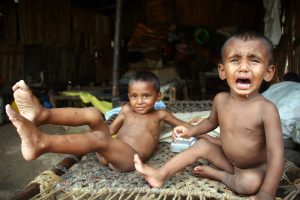Why is Poverty a Problem?
Poverty is still a big problem because it is complex to deal with. After all, Jesus said, “The poor you will always have with you” (Matthew 26:11). The Statement highlights the nature of poverty. Essentially, the most widely used poverty definition focuses on economic poverty. Similarly, poverty means the state of one who lacks a usual or socially acceptable amount of money or material possessions. Poverty is said to exist when people lack the means to satisfy their basic needs. Which adversely impacts a country’s basic functioning unit the family.
The focus economic on poverty does not highlight the multi-faceted hydra, a proper definition of poverty must address the many different types of poverty and acknowledge that poverty is hunger and lack of shelter, illiteracy and not having access to school, being sick and unable to see a doctor, fearing for the future, living one day at a time and feeling completely powerless and trapped by things beyond one’s control.
While the causes of poverty may seem as multi-faceted as a diamond, we can group them into two primary categories—culture and believing the lie of worthlessness.

Copyright: ©2018 World Vision/photo by Jon Warren
Causes of Poverty
Cultural Causes
Cultures have internal and external elements that contribute to the existence of poverty. Some of these conditions are tangible and external, like:
Lack of shelter, Limited access to clean water resources, Food insecurity, Physical disabilities, Lack of access to health care, Unemployment, Absence of social services, Gender discrimination, Poor infrastructure, Government corruption, Environmental circumstances such as natural disasters, droughts, limited resources or depletion of natural resources Other elements are intangible and internal—knowledge, aspiration, diligence, confidence, leadership styles, participatory governance, social capital, values, and peace, to name a few.

The Lie of Worthlessness Causes Poverty
Poor people often believe they are failures. And this message of oppression and hopelessness affects their ability to hope for a better future. Their grandfathers lived in poverty. Their fathers lived in poverty. The cycle continues with them and will continue to the next generation as well.
When people believe this lie of poverty, that they are worthless because of their circumstances, they become victims. They lose hope and without hope, it’s difficult to dream of a better way and almost impossible to be an agent for positive change. When people in poverty have a low view of themselves and no hope for the future, their relationships are affected. They have low regard for other people and don’t believe that their relationships will get better.
Children are particularly vulnerable to this lie. When poverty surrounds them, they believe they have no value or purpose. The solution is introducing a voice that transforms the worthless and hopeless mindset into a message of truth: “I matter. I have worth. Things can get better.” This change in mindset is easiest when it is done early in a person’s emotional development. Therefore, it is best done with a child. That way, the lie can’t take shape and influence the child’s identity. The voice of truth can be strong and influential in the life of a little child. Freedom from poverty is possible.

